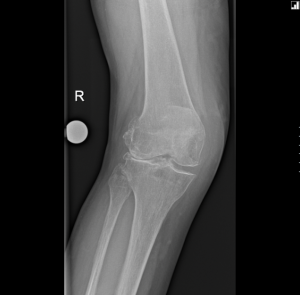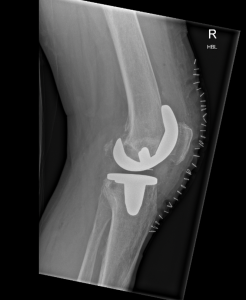Knee replacement is a surgical option for the treatment of knee arthritis.
Surgery replacing all parts of the knee is called Total Knee Replacement (TKR), and surgery replacing only one part of the knee is called Unicompartmental Knee Replacement (UKR). The most suitable operation for you will be decided at the time of the consultation, based on X-rays and examination.
What is arthritis?
Arthritis is a general term meaning damage to a joint. The most common form is osteoarthritis, where the damage is mostly caused by ‘wear and tear’. Other causes of arthritis include inflammatory diseases (such as Rheumatoid or Psoriasis) and previous injury (such as fractures or dislocations).
Is surgery the only option?
No, surgery should always be used as a last resort.
Although arthritis can be life-changing it is never life-threatening. During our consultation I will discuss your options with you. If I believe that surgery would help you, we can discuss the pros and cons at your appointment. You should take your time to make your decision carefully. The decision to have surgery is ultimately yours.
In some cases you may be very keen to have surgery, however I may recommend waiting a while and re-assessing the benefits of surgery at a later date.
What are my alternatives to surgery?
I will discuss these with you. However, in general there are three main things that will help to ease the pain from arthritis:
- Painkillers. Always start with simple painkillers like paracetamol and ibuprofen. Talk to your GP about which ones are best for you. Taking simple painkillers on a regular basis can help to keep the pain at a more manageable level.
- Activity modification. This means avoiding activities that hurt your hip, but increasing the activities that do not hurt your hip. For example, switching from regular walking to regular swimming. It may also mean something as simple as using a walking stick.
- Weight loss. If you are overweight or obese, you should aim for a weight loss of at least 10% by making changes your diet and increasing your activity. This is certain to reduce the load on your knees, and therefore reduce pain. This can be very effective in improving the pain of knee arthritis.
Can I have my knee injected instead?
An injection of steroid and local anaesthetic into your knee might decrease your pain. However, this is only suitable for some people and is only temporary. If it is an option for you, we will discuss it at your consultation.
If I decide to have surgery, what happens next?
Once surgery is planned, you will undergo ‘pre-assessment’. That means that we will check if you are fit to have the operation. This will involve checking your vital signs and taking some blood tests at the very least. If you have lots of medical conditions it might also involve further tests and a consultation with the anaesthetist. If it is deemed safe to proceed with the operation, then the hospital administration team take over and we find you a suitable date for surgery.
How long will I have to wait between consultation and surgery?
This depends on two things:
- The duration of the pre-assessment phase for you. A patient who has no medical conditions will pass through this stage more quickly than someone who requires lots of tests.
- The location of the surgery. I operate in Craigavon Area Hospital (public only), Ulster Independent Clinic and in Sports Surgery Clinic. I will be able to give you an estimated waiting time at the consultation.
How long does the operation take and what do you do?
The operation takes approximately one hour. It involves removing the remaining cartilage and a very small amount of bone from the end of the femur and top of the tibia. The ‘replacement’ is a metal cap on the femur and a metal cap on the tibia with a plastic spacer between the two.
What complications can happen?
Complications are not common, but there are no guarantees with any surgery. The complications can be very serious, including death. Below I list the most serious complications, and the explain the approximate chances of it happening.
1. Blood clot in the leg.
A blood clot in your leg is called a Deep Venous Thrombosis (DVT). The risk of this happening is 2%. It is treated with blood thinning medication. A DVT slows down your recovery. To try to prevent a DVT forming we do two things.
Firstly, we encourage you to stay on the move, both before the operation and after the operation. We will try to get you out of bed and walking on the same of your operation.
Secondly, we will give you a preventative blood thinning medication for a number of weeks after the operation.
2. Blood clot in the lung.
This type of blood clot is called a Pulmonary Embolus (PE). It can be very serious and in the worst-case scenario can cause death. The risk of fatal PE is 0.1%. The same steps we take to prevent a DVT will also help to prevent a PE.
3. Infection.
The risk of an infection getting into your new knee replacement is 1%.
The infection can get in to your new knee either from the wound or from the blood. In some cases it is a mild problem for which we give antibiotics, but in some cases it is a major problem requiring multiple operations and prolonged antibiotics. There are things we do to prevent this including using special orthopaedic operating theatres, using antibiotics for 24 hours after your operation and not prolonging your stay unnecessarily in hospital after surgery.
Please follow these important steps to minimise your risk:
- Stop smoking, preferably well in advance of your surgery
- Exercise, eat well, and rest well leading up to your surgery
- Do not shave the surgical site in the few days leading up to surgery
- Wash well before coming to hospital
- Inform us if you have had any signs of illness leading up to surgery
- Get a plan in place for after the operation. The biggest reason for delayed discharge after a knee replacement is waiting for home modifications or extra home help. The longer you stay in hospital after surgery, the higher the chance of picking up an infection in hospital.
Other complications that could happen are listed below. Make sure to ask me at the time of the consultation or before surgery if you have any questions about these.
- Damage to the bones, nerves, blood vessels or ligaments around the knee
- Dislocation of the new knee replacement
- Increased stiffness
- Increased pain
- Dissatisfaction with the new knee replacement
How successful is knee replacement surgery?
A successful knee replacement is one that has given you a pain-free joint. It will allow you to get a good sleep and do the simple things in life again without having to think about your knee. This is achieved in more than 8 in 10 (85%) cases. That means that 15% of patients do not get ‘success’, and in fact 1 in 20 patients (5%) actually feel worse after having the knee replacement.
How long is the recovery period?
The following is a broad guide to how most people recover:
- Day 0 – Knee replacement
- Day 0- Take first steps a few hours after the operation
- Day 2- Discharged from hospital on two crutches
- Day 14 – Removal of skin clips
- Week 4 – Feeling strong enough to use 1 crutch only
- Week 6 – Feeling strong enough to walk without crutches
- Week 6 – Start driving again
- Month 3 – Swelling much less now. Starting to walk without a limp
- Month 6 – Occasional stiffness and swelling. Walking with more speed
- One year – Feeling good. You will often forget that you had a knee replacement
I encourage my patients to use My Recovery App on your mobile phone. This gives detailed education and information for each step of your recovery, including videos.
What about Unicompartmental Knee Replacement?
Unicompartmental knee replacement is also called a ‘partial’ knee replacement. In this surgery only a portion of the knee is resurfaced. This procedure is an alternative to total knee replacement for patients whose disease is limited to just one area of the knee. During your appointment we will discuss whether this surgery would be an option for you.
How long will my new knee last for?
If you do not have any complications and you look after your knee, I hope it will last for the rest of your life. However, your age at the time of surgery has an impact on this. A person who is 30 years-old will do many more miles on their new knee than an 80 year-old.

